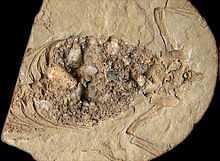Hovasaurus
From Wikipedia, the free encyclopedia
| Hovasaurus Temporal range: Changhsingian - Induan 253.8–249.7Ma | |
|---|---|
 | |
| Life restoration of Hovasaurus boulei | |
| Scientific classification | |
| Kingdom: | Animalia |
| Phylum: | Chordata |
| Class: | Reptilia |
| Family: | †Tangasauridae |
| Genus: | †Hovasaurus Piveteau, 1926 |
| Type species | |
| †Hovasaurus boulei Piveteau, 1926 | |
Hovasaurus is an extinct genus of diapsid reptile belonging to the Order Eosuchia. It lived in what is now Madagascar during the Late Permian.

Specimen with gastroliths
Hovasaurus resembled a slender lizard, and was around 50 centimetres (20 in) long, of which two thirds was taken up by its long tail. It was well adapted to an aquatic life, with the tail being laterally flattened like that of a sea snake. Some stones have been found in the abdomen of fossil Hovasaurus, indicating the creatures swallowed these for ballast, preventing them from floating to the surface when hunting fish.[1]
References
- P.J. Currie, 1981, Hovasaurus boulei, an aquatic eosuchian from the Upper Permian of Madagascar, Palaeontographica Africana 24: 99-168
- D. Lambert, D. Naish and E. Wyse 2001, "Encyclopedia of Dinosaurs and prehistoric life", p. 77, Dorling Kindersley Limited, London. ISBN 0-7513-0955-9
This article is issued from Wikipedia. The text is available under the Creative Commons Attribution/Share Alike; additional terms may apply for the media files.